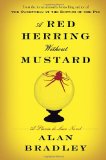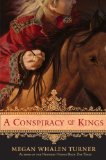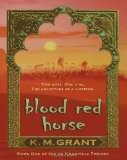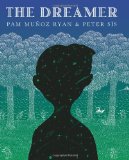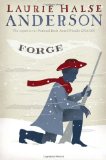Review of Stonewall Hinkleman and the Battle of Bull Run, by Michael Hemphill and Sam Riddleburger
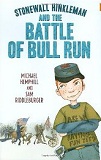 Stonewall Hinkleman and the Battle of Bull Run
Stonewall Hinkleman and the Battle of Bull Run
by Michael Hemphill and Sam Riddleburger
Dial Books for Young Readers, 2009. 168 pages.
Starred Review
This book was absolutely perfect reading for this weekend — the 150th anniversary of the 1st Battle of Bull Run. I actually had tickets to a reenactment today, an especially big one because of the Sesquicentennial. However, then we had a heat wave and I’ve had a headache for three weeks that I’m really hoping will finish up. Basically, I figured out that being outside during a heat advisory to watch people pretend to kill each other probably wouldn’t be a very smart thing to do. Instead, I read this book, and it thoroughly convinced me I made the right choice!
I love the way the book begins, giving you the tone right from the start:
“All right, let’s get the whole name thing out of the way quickly.
“My name is Stonewall Hinkleman.
“No, it’s not a nickname. It’s my real name. Like I tell my parents — even Stonewall Jackson’s real name wasn’t Stonewall. But they don’t listen and it’s too late now anyway. I’m stuck with it.
“So, you’d think I could at least go by my middle name, right? It’s Traveler, after Robert E. Lee’s horse. Yeah, that’s right, a horse!
“I’m Stonewall Traveler Hinkleman and if you think that’s as bad as it gets, you haven’t heard the worst part.
“You see, both of my parents are Civil War reenactors. This means my dad — who’s really a geeky computer tech — dresses up in a uniform and runs around in fields with a bunch of other boring guys who are all pretending they are in the Civil War. My mother pretends she’s a nurse, even though in real life she barfs at the sight of blood.”
And Stonewall explained all about a reenactment, so I didn’t need to see it myself!
“You want to know what a reenactment is really like? It doesn’t matter which battle it is, because they’re all the same.
“A big bunch of guys wearing blue Yankee costumes come huffing up the hill. Waiting for them are my dad’s friends — a big bunch of guys in gray Confederate costumes. We jump out and we charge. I have to blow my bugle and everybody else fires their guns, which don’t have ammo but are still ridiculously loud. About half of them fall down and pretend to be dead. They roll around with these hilarious grimaces on their faces. Then they’re still for a while, probably taking a nap or eating a candy bar, until the ‘battle’ moves somewhere else and they get back up and rejoin the ‘fight.'”
But the reenactment of the First Battle of Bull Run ends up being completely different for Stonewall. You see, he left his bugle at home. When he goes to buy a replacement, he’s given a magic bugle. He doesn’t know it’s magic until he blows it and it sends him back in time — to the actual Battle of Bull Run. It turns out, he’s been sent on a mission. A crazy right-wing nut has also gone back in time, and he’s planning to change history to make it so the South will win the war. Stonewall’s job is to stop him. Fortunately, the crazy guy’s beautiful daughter, about Stonewall’s age, also got sent back in time.
And the real battle is not anything like a reenactment.
“Am I freaked out? Of course I’m freaked out. Reenactments may be boring, but at least they’re predictable — pretend to charge, pretend to shoot, pretend to die. But there’s no pretend about this. I can actually hear bullets buzzing over my head. I look down. There’s a guy on the ground in front of me holding his bloody stomach and trying to keep his insides from spilling out. I throw up all that leftover soup I ate for breakfast.”
This book is a completely fun way to learn about Civil War history. I’ve listened to Bull Run, by Paul Fleischman. It’s very excellent and well-written, but I’m not sure I retained a lot. In this case, following along with Stonewall Hinkleman, I got a much better grasp of the advances and retreats involved in the battle. Of course, I’ve also been to the battlefield (It’s a few miles down the road.), so it was easy to visualize the houses, roads, and hills he refers to. (And that made me wonder how they can make the reenactment work at all, since it doesn’t take place on the actual battlefield, just on a big field — without the houses and hills at the actual battlefield.)
I loved it that Stonewall knew what was going on because of his parents being Civil War buffs and his having gone to reenactments all his life. He knew when Yankee charges were due; he knew when to expect retreat. His perspective makes it easy for the reader also to understand the various movements of the battle.
And Stonewall meets his great-great-great-great-uncle Cyrus, the one he’s always mocked for getting shot in the butt at Bull Run and dying of an infection. It turns out that Cyrus is a teen and the furthest possible thing from a coward. In fact, Stonewall would like to just get out of there, but that’s hard to do when someone like Cyrus is around, gallantly helping the injured, capturing artillery, and the like.
I’ll definitely be pushing this book all summer. In fact, I think it will make great reading for the entire Sesquicentennial. It gives you a taste both of what the war was like and also the whole reenactment craze. But even more, it’s a great read. Laugh-out-loud funny, but with real danger and a difficult task.
Sam Riddleburger is the pseudonym of Tom Angleberger, who wrote The Strange Case of Origami Yoda, and he’s becoming my number one choice of author for middle school boys. Though it’s not only middle school boys who love his books.
Find this review on Sonderbooks at: www.sonderbooks.com/Childrens_Fiction/stonewall_hinkleman.html
Disclosure: I am an Amazon Affiliate, and will earn a small percentage if you order a book on Amazon after clicking through from my site.
Source: This review is based on a library book from the Fairfax County Public Library.


